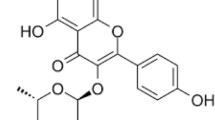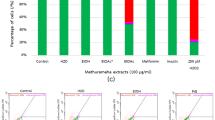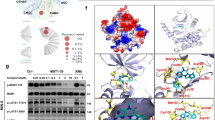Abstract
trans-Resveratrol (t-RVT), a naturally occurring polyphenol found in Polygonum cuspidatum, grape, and red wine, has been reported to have anti- inflammatory, cardioprotective, and cancer chemopreventive properties. However antidiabetic effect of t-RVT has not yet been reported. In this study, we show that t-RVT increases glucose uptake in C2C12 myotubes by activating AMP-activated protein kinase (AMPK), uncovering an antidiabetic potential of t-RVT for the first time. AMPK plays a central role in the regulation of glucose and lipid metabolism, and hence it is considered a novel therapeutic target for metabolic syndrome such as type 2 diabetes. t-RVT significantly induced glucose uptake in C2C12 cells, via AMPK activation, but not a phosphatidylinositol-3 kinase (PI-3 kinase) signal pathway. The induced glucose uptake was attenuated by pretreatment with a pharmacological inhibitor for AMPK, indicating that the effect of t-RVT primarily depends on AMPK activation. However, in the presence of insulin, t-RVT also potentiated the effect of insulin on glucose uptake via AMPK activation, which led to further activation of PI-3 kinase/Akt signal pathway.
Similar content being viewed by others
Article PDF
Author information
Authors and Affiliations
Rights and permissions
This is an Open Access article distributed under the terms of the Creative Commons Attribution Non-Commercial License (http://creativecommons.org/licenses/by-nc/3.0/) which permits unrestricted non-commercial use, distribution, and reproduction in any medium, provided the original work is properly cited.
About this article
Cite this article
Park, C., Kim, MJ., Lee, J. et al. Resveratrol stimulates glucose transport in C2C12 myotubes by activating AMP-activated protein kinase. Exp Mol Med 39, 222–229 (2007). https://doi.org/10.1038/emm.2007.25
Published:
Issue date:
DOI: https://doi.org/10.1038/emm.2007.25
Keywords
This article is cited by
-
A spotlight on underlying the mechanism of AMPK in diabetes complications
Inflammation Research (2021)
-
Resveratrol potentiates intracellular ascorbic acid enrichment through dehydroascorbic acid transport and/or its intracellular reduction in HaCaT cells
Molecular and Cellular Biochemistry (2020)
-
Camptothecin activates SIRT1 to promote lipid catabolism through AMPK/FoxO1/ATGL pathway in C2C12 myogenic cells
Archives of Pharmacal Research (2019)
-
AMPK activators: mechanisms of action and physiological activities
Experimental & Molecular Medicine (2016)
-
Postprandial insulin and glucose levels are reduced in healthy subjects when a standardised breakfast meal is supplemented with a filtered sugarcane molasses concentrate
European Journal of Nutrition (2016)



